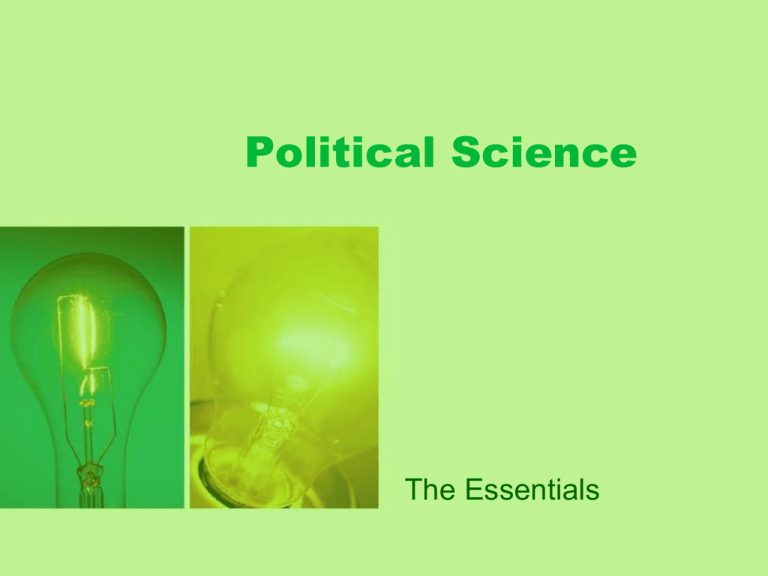Political Science The Essentials
advertisement

Political Science The Essentials Politics and change • Your textbook argues that “studying politics involves studying change.” • Do you agree? • What about politics involves change? Politics and change • Notice in the readings how politics occurs throughout society, even within the workplace or the family, and societal needs & demands change over time. • Political scientists focus on politics of the State, that is, of the government. But even government policies affect our personal lives. Governments • Government is the formal mechanism or structure through which we collectively make and implement public choices. • Public policies determine how wealth and power are distributed in the society, and those policies in turn affect all of us - our income, our safety, our access to clean water, medicine, & education, and even our life expectancy. Governments resisting change • Sometimes, governments do not serve society’s needs, particularly in rapidly changing times. • If a government fails to adjust to society’s changes, people will organize outside of it in an effort to force it to act (through social movements). People may even fight the government (through revolution). Governments resisting change In the 1850s, for example, the U.S. government was unable to respond to the growing demands of those opposed to slavery. 1. neither existing political party was willing to accept the abolitionist platform. 2. slave-interests in Congress were politically and economically powerful. 3. the Supreme Court supported slave interests, citing the Constitution. 4. many moderate Americans thought abolitionists were too radical & would tear the country apart. Governments resisting change What happened? Despite the efforts of political leaders to ignore the issue, it did not disappear. Instead: 1. One long-time political party – the Whigs – disappeared, replaced by the Republican Party & Abraham Lincoln in the 1860 election. 2. Southern states seceded (not northern abolitionist states) and civil war ensued. Political actors • Governments are major political actors, but they aren’t the only ones. • Who else are? Political actors • Individuals, neighborhoods, interest groups, political parties, news media, business interests, professional associations, international organizations, etc. • What type of political actions do they engage in? Types of political activities • Elections and campaigns, law making, lobbying, court rulings, letters to the editor, demonstrations outside of city hall, war, in some circumstances even bombing a building. • Politics includes activities that are legal and illegal, local and global, ordinary and dramatic. Importance of politics • Politics is important; it’s how we live in common, regardless of if we live in a free democratic society or if we live under the Taliban or the Nazis. • It is about the distribution of resources – the benefits and the burdens in the society. Economics & politics • When we talk about a political system, we also refer to its economic system. However, no particular economic system has to go with a particular political system. For example: • The U.S. has a democratic political system and a capitalist economic system, but some other democracies have a socialist economic system, and some authoritarian political systems follow a capitalist economic system. • These distinctions will become more clear through the semester. • For studying politics, remember that it is an ancient field of study. History of the field Political philosophy dates back to Socrates (469-399 B.C.) and the ancient Greeks, although the academic study of political science is only about 120 years old. . Subfields Six subfields: public law, public administration, political theory, American government, comparative politics and international relations. Sometimes, these areas are broken down a little differently, as in the textbook. And new fields are emerging, such as women in politics, and politics & literature. Approaches to studying politics • Political scientists who focus on normative questions seek to discover the ideal way that politics should work, in hopes of improving our political institutions. It is concerned with moral or ethical questions. Normative study: how should politics work? • The normative approach was used by Plato, the student • of Socrates, who • tried to define • justice and • the good society. • He lived from • 427 to 347 BC. Approaches to studying politics • Political scientists may be empiricists that is, they may be trying to understand how things actually work, not how they should work. They are less concerned with ideals than with facts. Empirical study: how do politics work? • Empirical researchers collect facts or data through observation. They try to describe political behavior and processes, and to use that knowledge to make predictions about future political behavior. • Empirical & normative scholars use different tools. Different tools to study politics 1. Traditionalism - Using history and philosophy to seek a non-numerical indepth understanding of a few cases. Scholars may study the constitutional cases of the Supreme Court, for example. They also tend to limit their study to formal politics – laws, government offices, official actions. Different tools to study politics • 2. Behavioralism - focusing on actual behavior of political actors, rather than on formal rules. Behaviorists are not interested in ethical questions. Often rely on statistical methods • For example, what is the socio-economic background of federal judges, and is there a correlation between that background and how they rule in certain cases, that is, how they behave? Different tools to study politics • Behaviorists criticize traditionalists for being unscientific, because traditionalists do not use statistical methods. They also believe that ethics and value judgments have no place in research, because they are subjective and ethnocentric; that is, they arise out of a particular culture, and therefore not universal. Reaction against behavioralism • 3. Postbehavioralism – combining the two approaches; recognizing that research should be relevant and ethical as well as empirical. Post-behavioralism • Critical of behavioralism: • 1. lack of relevance. The questions behavioralists ask are often not the relevant or important ones for a political society. • 2. ethnocentrism. Like traditionalists, behaviorists are rooted in their own culture – in this case, a scientific culture, which assumes that everyone else is wrong. They are not value free and neutral as they claim.



